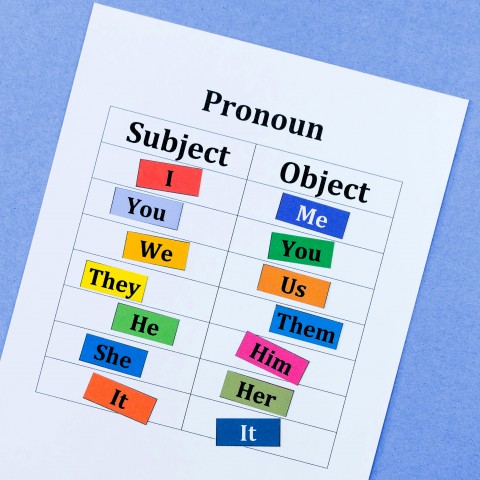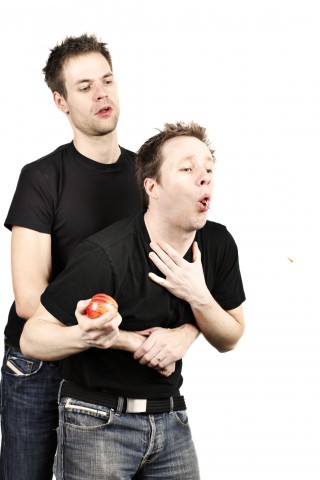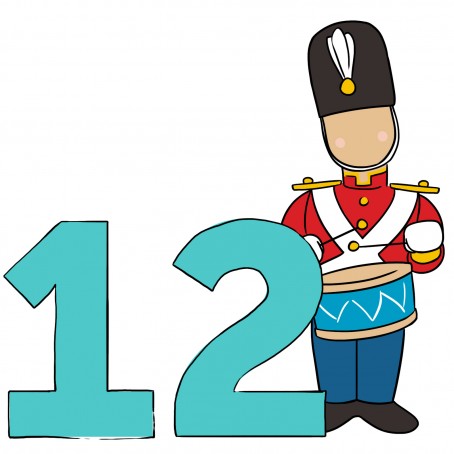
Let me look into my magic crystal ball and tell you what I see… You’re interested in learning Turkish or have just started working on it. You’re curious to know what Turkish grammar looks like and whether it’s similar to English grammar. And actually, you’re dying to learn what kind of an adventure you’re getting yourself into.
Of course, I’m not a fortune teller. But if I guessed correctly, you’re at the right address. This page serves as an overview of Turkish, an essential grammar guide, and a quick reference for those who want to brush up on specific grammar topics.
Our quick guide will show you the similarities and dissimilarities between Turkish and English as well as the basic structure of Turkish grammar, from vowel harmony to conjugation.
Let’s get started.
 Table of Contents
Table of Contents
- General Overview
- Word Order
- Word Structure and Agglutination
- Suffixes, Vowel Harmony, and Buffers
- Possessives
- Verbs and Conjugation
- Access More Turkish Grammar Content on TurkishClass101.com
1. General Overview
Before we get into the details, it’s important that we cover the basic Turkish grammar rules and how they compare to those you’re familiar with in English.
Similarities
First of all, both languages use the Latin alphabet. The Turkish alphabet, however, consists of 29 letters, 6 of which don’t exist in English ( -ç, -ğ, -ı, -ö, -ş, -ü). There are also 3 letters in English (-q, -w, -x) that don’t exist in the Turkish alphabet.
There are a few words that exist in both Turkish and English that have the same meaning:
- ➢ TV
➢ Plan
➢ Program
➢ Market
➢ Silo
➢ Video
Like English, Turkish also uses the indefinite article in front of nouns as a separate word:
- ➢ Bir araba (“A car”)
➢ Bir otel (“A hotel”)
In addition, neither Turkish nor English uses grammatical gender for objects.
It’s safe to say that there are no accent marks in English, since the words that have them are taken from other languages. There are no accent marks in Turkish, either.
However, the circumflex is used for some loanwords. It affects the pronunciation of a word by implying that the word’s pronunciation should be longer or that there should be palletization of the consonant that comes before the vowel.
For example: “Âmâ” is an Arabic word that means “blind.” The circumflex here makes both of the “a” sounds longer. There’s another word, “ama,” which means “but.” Although they are spelled the same way (except for the circumflex), those two words are pronounced differently.
Dissimilarities
Now let’s take a look at the features of Turkish grammar that differ from English.
Pronouns
There’s just one word used in Turkish for “he,” “she,” and “it,” which is o.
In Turkish, the plural “you” is not only used as it is in English, but also as a polite, formal way of addressing someone. The same set of rules apply to both the plural “you” and the polite “you” in Turkish.
The Definite Article
Turkish has no definite article (“the”) as a separate word. When definite nouns or pronouns are used as an object, then they take the “-ı, -i, -u, -ü” suffixes based on the vowel harmony rules. Let me give you an example:
- ➢ Anahtarlar çantamın içinde. (“The keys are in my purse.”)
Here, “keys” is used without an article.
- ➢ Anahtarları çantamın içine koydum. (“I put the keys in my purse.”)
Here, “keys” takes the suffix -ı to indicate the definite article.
Numbers as Adjectives
When numbers are used as adjectives to count nouns, the noun does not become plural based on the number. Rather, it stays in the singular form. Here’s an example:
- ➢ Bir elma (“One apple”)
➢ Beş elma (“Five apples”)
Word Order
The Turkish word order is Subject-Object-Verb. This topic will be covered in more detail later.
Vowel Harmony and Suffixes
Vowel harmony is another feature that doesn’t exist in English. You can see the details about this in the “Suffixes, Vowel Harmony, and Buffers” section of this page.
Conjugations
The conjugation in Turkish is much different from that in English, which we’ll discuss in more detail later on in the “Verbs and Conjugation” section. But to give you an example, there’s a tense called “reported past tense,” which doesn’t exist in most languages.
2. Word Order
In Turkish grammar, word order typically follows the SOV (Subject-Object-Verb) structure. In other words, the sentence begins with the subject, which is followed by the object (if any), and then the verb.
However, this is not a strict rule and there’s some flexibility, meaning that you can put an object or a verb at the beginning of a sentence. Doing so won’t change the meaning of the sentence, but the word you’re emphasizing will definitely change.
The word that you want to stress should be placed as close to the verb as possible, and if you want to emphasize the verb, then you should place it at the beginning of the sentence.
| Subject-Object-Verb | Ben okulumu seviyorum. | “I love my school.” |
| Object-Subject-Verb | Okulumu ben seviyorum. | “I love my school.” |
| Object-Verb-Subject | Okulumu seviyorum ben. | “I love my school.” |
| Verb-Subject-Object | Seviyorum ben okulumu. | “I love my school.” |
All of the sentences above have the same meaning, but the emphasis is on the words highlighted in blue.
- → Also see our article A Journey into the Turkish Word Order for more detailed information on how this aspect of Turkish grammar works!

3. Word Structure and Agglutination
In Turkish grammar, suffixes and vowel harmony play a huge role in how words are formed and used. In this section, we’ll introduce you to word structure and agglutination in Turkish.
Structure of Words
In the structure of a Turkish word, a vowel always follows a consonant and a consonant always follows a vowel:
- ➢ bebek (“baby”)
➢ araba (“car”)
Therefore, if you see a word where one consonant follows another, you can tell that it’s a loanword:
- ➢ pratik (“practical”)
➢ armut (“pear”)
In order to keep the “vowel + consonant” rule, buffers are used. Those buffers are “y, n, s.”
You can see some relevant examples of this in our section on vowel harmony and buffers.

Agglutination of Words
Turkish is called an agglutinative language, meaning that new words are formed by adding suffixes to the root words. To give you an idea, a suffix can be added to a noun to 1) make it another noun, or 2) turn it into a verb. It can also be added to a verb to make it a noun or another verb.
Are you confused? Here are some examples to help you understand these Turkish suffix rules better:
- ➢ Yolcu (Noun) – “Passenger”
Yolcu+luk = Yolculuk (Noun) – “Trip”
- ➢ Göz (Noun) – “Eye”
Göz+le = Gözle (Verb) – “Observe,” “Monitor”
- ➢ Bil (Verb) – “Know”
Bil+mece = Bilmece (Noun) – “Puzzle”
- ➢ Kal (Verb) – “Stay”
Kal+dır = Kaldır (Verb) – “Lift,” “Remove”
4. Suffixes, Vowel Harmony, and Buffers
People who want to learn Turkish grammar and vocabulary usually think that these characteristics are really interesting, probably because they don’t exist in most other languages. I wonder if you’ll agree with them!
That said, these are some of the most important Turkish language grammar rules, so pay attention.
Vowel Harmony
In Turkish, words are structured so that vowels follow a certain pattern, and this pattern is called vowel harmony. It’s used to determine which vowel will be used when adding a suffix to a word. Here’s a table showing the vowel types:
| FRONT | BACK | |||
| UNROUNDED | ROUNDED | UNROUNDED | ROUNDED | |
| OPEN | -e | -ö | -a | -o |
| CLOSED | -i | -ü | -ı | -u |
And here are the vowel harmony rules:
- Back vowels follow back vowels and front vowels follow front vowels.
- Unrounded vowels follow unrounded vowels.
- A rounded vowel can be followed by a mix of rounded closed and unrounded open vowels.
Suffixes
Let’s see when suffixes are added:
- Suffixes are based on the person/subject that a verb alludes to.
- Suffixes are used when the subject is plural.
- Suffixes are used based on the tenses.
- Suffixes are used if there is negativity.
- Suffixes are used if interrogative particles will be used.
- Suffixes are used when passive, reflexive, causative, or a verb of mutual action will be formed.
- When definite nouns or pronouns are used as an object, then they take the “-ı, -i, -u, -ü” suffixes, based on the vowel harmony rules.
- Suffixes are used when using possessive pronouns, since there are no separate words for them in Turkish. The suffixes “-m, -ım, -im, -um, -üm” (in conjugated forms) come after the pronoun to make it possessive.
- Suffixes are used when motion towards an object (to), motion from an object (from), and static location (on, at) is to be specified.
It’s a great thing to be able to use the right suffix! However, you also need to make sure that you choose the right vowels for those suffixes based on the vowel harmony.
Buffers
As mentioned earlier, there are three buffers (y, n, s). These are used to maintain the “vowel + consonant” rule when adding suffixes.
- Usage of “y“:
- Used with an accusative suffix
Example: Silgi+y+i = Silgiyi (“The eraser”) - Used with dative. (Movement towards something)
Example: Parti+y+e = Partiye (“To the party”)
- Used with an accusative suffix
- Usage of “n“:
- Used with genitive case [Ownership]
Example: Ayna+n+ın = Aynanın (“The mirror’s”)
Aynası+n+ın = Aynasının (“His/her/its mirror”) - Used for nouns that already have suffixes
Example: Boya+lar+ı+n+a = Boyalarına (“To their paints”)
Oda+sı+n+dan = Odasından (“From his/her/its room”)
- Used with genitive case [Ownership]
- Usage of “s“:
- Only used with the third person suffixes (-ı, -i, -u, -ü)
Example: Elma+s+ı = Elması (“His/her/its apple”)
- Only used with the third person suffixes (-ı, -i, -u, -ü)
5. Possessives
In Turkish grammar, possessives are formed much differently from how English speakers are used to. In this section, we’ll cover two topics: how to form possessive pronouns and how to use the possessive (genitive) case.
Possessive Pronouns
In the Turkish language, there aren’t separate words that stand for possessive pronouns. However, suffixes (-m, -ım, -im, -um, -üm), in conjugated forms, come after a pronoun to make it possessive. Let’s take a look at a couple of examples:
- ➢ Sen+in = Senin (“Your”)
➢ Biz+im = Bizim (“Our”)
Possessive pronouns can be omitted because the nouns they are modifying also take suffixes, which imply the possessive pronoun. However, if you want to stress the possessive pronoun, then you can use it in the sentence. Here are some examples:
- ➢ Benim valizim çok küçük. (“My suitcase is very small.”)
Valizim çok küçük. (“My suitcase is very small.”)
- ➢ Sizin aileniz nerede? (“Where is your family?”)
Aileniz nerede? (“Where is your family?”)
Possessive (Genitive) Case
In the possessive case, both the “possessor” and “possessed” are suffixed. Here are a couple of examples:
- ➢ Araba+nın anahtar+ı (“The car’s key”)
➢ Elbise+nin düğme+si (“The button of the dress”)
6. Verbs and Conjugation
The final points we’ll cover today have to do with verbs and conjugation.
- → Because these are such crucial topics, we recommend that you also study our lesson on the Top 20 Turkish Verbs and read our blog post on Turkish verb conjugation.
How to Form Different Types of Verbs
- Passive verbs are formed by adding the affixes -n, -il, or -in. Here are some examples:
Okumak (“To read”)
Oku+n+mak (“To be read”)
Germek (“To stretch”)
Ger+il+mek (“To be stretched”)
Silmek (“To erase”)
Sil+in+mek (“To be erased”)
- Causative verbs are formed by adding the affixes -dir, -t, or -ir. Below are some examples:
Yemek (“To eat”)
Ye+dir+mek (“To make somebody eat”)
Pişirmek (“To cook”)
Pişir+t+mek (“To have something cooked”)
İçmek (“To drink”)
İç+ir+mek (“To make someone drink”)
- Reflexive verbs are formed by adding the -in affix. Here is an example:
Giymek (“To wear clothes”)
Giy+in+mek (“To dress oneself”)
- Verbs of mutual action are formed by adding the -iş affix. For example:
Çarpmak (“To hit”)
Çarp+ış+mak (“To collide”)
Reported Past Tense
I can hear you asking, “Reported tense? What is that?”
You’re absolutely right in asking this question because it’s not a very common tense.

It’s used:
- when the speaker is explaining something that he/she hasn’t witnessed, but heard from someone else
Annem bana hediye almış. (“My mother bought me a gift.”)
[My mother told me she did, but I didn’t see her buying it.]
- when telling a story
Güzel bir kız varmış. (“There was a beautiful girl.”)
[I haven’t seen the girl, it’s just a character in a story.]
- when the speaker is telling someone that he/she (the speaker) has done something without noticing it
Durakta uyumuşum ve otobüsü kaçırmışım. (“I slept at the bus stop and missed the bus.”)
[I didn’t realize I slept and missed the bus.]
Ben kitabı daha önce okumuşum. (“I have read this book before.”)
[I started reading a book, but realized that I read it before and forgot until now.]
- when you’re telling someone about your dream
Rüyamda çok zenginmişim. (“I was very rich in my dream.”)
[It’s like storytelling; you’re telling someone about your dream, which is not reality.]
- when imagining something and telling someone
Mesela, benim iki çocuğum varmış. (“For example, I had two kids.”)
[This is again not reality; you’re imagining that you had two kids.]
Verb Conjugation
In Turkish grammar, verb conjugation is based on the following factors:
- Person / Subject: In Turkish, different suffixes are added to a verb based on the person/subject it alludes to. Vowels in the suffixes change based on the vowel harmony rules.
- Number of Subjects: Whether the subject is singular or plural impacts the suffix that the verb will get.
- Politeness Level: As mentioned above, the plural “you” is also the polite “you” and the same rules are applied to both.
- Tense: Based on the tense, verbs take different suffixes.
7. Access More Turkish Grammar Content on TurkishClass101.com
In this article, we presented you with information on the major topics of Turkish grammar. Which aspects seem the most difficult to you, and why? Let us know in the comments!
Now that you have a better idea of what to expect from the language, you should have little trouble as you continue learning Turkish grammar online with us.
Want to learn Turkish grammar and vocabulary in depth? Bookmark TurkishClass101.com! Take advantage of our numerous audio recordings, vocabulary lists, and free resources—including our Turkish-English dictionary that you can refer to anytime.
Don’t forget that with a Premium PLUS subscription, you can also utilize our MyTeacher service to practice with a private teacher. He or she will work with you one-on-one and provide you with lessons and assignments tailored to your needs and goals, as well as personalized feedback to help you improve.
Best of all, you can learn Turkish anywhere, anytime by downloading the app for free!
Do you have suggestions, comments, or concerns? You can always provide us with feedback about all of the resources provided at TurkishClass101.com!

Well-Known Turkish Quotes That Learners Should Know

I don’t know how you feel, but quotes always make me excited, no matter their country of origin. They open my eyes and my heart. It’s intriguing to ponder what people lived and experienced, whether good or bad, that inspired their words of wisdom! Some of these quotes inspire us, some motivate us, some make us think, and some teach us something!
We believe that quotes can also give you greater insight into a country’s language and culture.
Are you ready to discover some great Turkish quotes with me? In this article, we’ll look at several Turkish quotes with translations in English, as well as some popular quotes from other languages translated into Turkish. This will give you the best of both worlds!
 Table of Contents
Table of Contents
- Quotes About Trust
- Quotes About Hope
- Quotes About Time
- Quotes About Knowledge and Ignorance
- Quotes About Money
- Quotes About Other Topics
- Rumi Quotes in Turkish
- Learn More With TurkishClass101
1. Quotes About Trust
What does trust mean to you? Here are some Turkish trust quotes to help you gain cultural insight into how the Turkish perceive it.
| 1 | Quote in Turkish | Kadınlar beğenince değil, güvenince âşık olur. |
| Literal Translation in English | “Women fall in love when they trust, not when they like.“ | |
| This is an anonymous quote which shows the importance of trust for women. | ||
| 2 | Quote in Turkish | Bir ölümün bir de kaybolan güvenin telafisi yok bu dünyada. |
| Literal Translation in English | “There is no compensation for either death or lost trust in this world.” | |
| This is another anonymous quote. It implies that losing trust in someone is as bad as death; just as trust cannot be recovered, neither can death be cured. | ||
| 3 | Quote in Turkish | İşin içine bir kere güvensizlik girdi mi, hiç bir şey eskisi gibi olmuyor. |
| Literal Translation in English | “When there is distrust, nothing is as it was in the past.” | |
| This is another anonymous quote. It means that distrust damages relationships. | ||
2. Quotes About Hope
Feeling discouraged or afraid of the future? Maybe one of these Turkish quotes about hope will motivate you to keep moving forward!

| 4 | Quote in Turkish | En geveze kuş ümittir. Kalbimizde hiç susmaz. |
| Literal Translation in English | “The most talkative bird is hope. It never stops in our hearts.” | |
| This is a quote by Cenap Şahabettin, who was a Turkish writer and poet. It means that our hearts are full of hope. | ||
| 5 | Quote in Turkish | Her kışın bir baharı, her gecenin bir sabahı vardır. |
| Literal Translation in English | “Every winter has its spring and every night has its morning.” | |
| This is a quote by Bediüzzaman Said Nursi, who was an Ottoman scholar and the founder of the Nurism movement. Corresponding quote in English: “Every cloud has a silver lining.” | ||
| 6 | Quote in Turkish | Tünelin ucunda ışık görünmese bile, ışık varmış gibi yürümek ve ışığın görüneceğine inanmak gerekir. |
| Literal Translation in English | “Even if there is no light at the end of the tunnel, it is necessary to walk as if there is light and believe that the light will appear.” | |
| This quote is by Amin Maalouf, who was a Lebanese-born French author. This quote encourages you to be hopeful even in hopeless situations. | ||
3. Quotes About Time
Time plays an important role in our lives. The following Turkish quotes on life focus on the concept of time and how it applies to us.
| 9 | Quote in Turkish | Bildiğim tek şey hiçbir şey bilmediğimdir. |
| Literal Translation in English | “All I know is that I know nothing.” | |
| This deep quote is from the Greek philosopher Socrates. It tells us that no matter how much we know, there is always much more to learn, and we should never stop searching and learning. | ||
| 10 | Quote in Turkish | Cahile söz anlatmak, köre renk tarifi gibidir. |
| Literal Translation in English | “To persuade an ignorant is like describing colors to a blind person.” | |
| This is a quote from İmam Evzai, who was a scholar and writer. The quote implies that it’s very difficult to deal with ignorant people. | ||
| 11 | Quote in Turkish | Dünyada her kötülük, daima cehaletten gelir. |
| Literal Translation in English | “Every evil in the world always comes from ignorance.” | |
| This quote is from Albert Camus, who was a French Algerian philosopher, author, and journalist. It emphasizes how bad and dangerous ignorance is. | ||
| 12 | Quote in Turkish | Eylem halindeki cehaletten, daha korkunç bir şey olamaz. |
| Literal Translation in English | “Nothing is scarier than ignorance in action.” | |
| This is a quote by Goethe, who was a German poet, novelist, playwright, critic, theatre director, scientist, and statesman. This quote also underlines the danger of ignorance. | ||
| 13 | Quote in Turkish | Cehalet, gönüllü talihsizliktir. |
| Literal Translation in English | “Ignorance is voluntary misfortune.” | |
| This is a quote from De Segur, who was a French general and historian. With this quote, he meant that people choose to be ignorant, and that it’s a bad choice because it leads to misfortune. | ||
5. Quotes About Money
Money is a crucial element of modern life, making it essential to manage it well. Here are a couple of quotes about money to shed some light on the topic.

| 14 | Quote in Turkish | Para iyi bir hizmetçi, kötü bir efendidir. |
| Literal Translation in English | “Money is a great servant, but a bad master.” | |
| This is a quote from Francis Bacon, who was an English philosopher and statesman. In saying it, he meant that those who know how to use and manage their money are those who make their money work for them. If people are not good masters of their money, then their money will start controlling them. | ||
| 15 | Quote in Turkish | İnsanın kazandığı paradan değil, paranın kazandığı insandan korkulur. |
| Literal Translation in English | “It’s not to be scared of the money that man earns, but the man who is earned by money.” | |
| This quote is from Necip Fazıl Kısakürek, who was a Turkish novelist, playwright, poet, and Islamist ideologue. If someone is making money by spending some effort, that’s good; but if he or she is being bought by money, then it’s dangerous. | ||
6. Quotes About Other Topics
Below are a few more Turkish quotes about life that didn’t quite fit into the other categories. Enjoy!
| 16 | Quote in Turkish | Biz ayrı dünyaların insanlarıyız. |
| Literal Translation in English | “We are from different worlds.” | |
| This quote has been used in many Turkish movies, usually between two lovers. It’s also used as a joke between friends in daily life. | ||
| 17 | Quote in Turkish | Açıklamalarla zamanınızı boşa harcamayın: insanlar sadece duymak istediklerini duyarlar. |
| Literal Translation in English | “Don’t waste your time with explanations: people only hear what they want to hear.” | |
| This is a quote from Paulo Coelho, a Brazilian lyricist and novelist. He wanted to point out that some people are prejudiced, egocentric, and not open to new ideas or thoughts; if they’re not willing to listen, no matter what, they won’t hear you. | ||
| 18 | Quote in Turkish | Sevelim, sevilelim, bu dünya kimseye kalmaz. |
| Literal Translation in English | “Let’s love, be loved, this world shall be left to no one.” | |
| This is by Yunus Emre, a poet and mystic who had a considerable impact on Turkish literature. He had great poems and quotes about love and human destiny. With this quote, he emphasized the fact that life is short and nobody is permanent in the world; he suggested not wasting the limited time we have and to love each other instead. | ||
| 19 | Quote in Turkish | Herkesin haksız olması, senin haklı olduğunu göstermez. |
| Literal Translation in English | “The fact that everyone is wrong does not show that you are right.” | |
| Some people say this quote belongs to Aristotle, and some say it belongs to Camus. Based on my internet research, it seems to be anonymous. This is a quote to awaken those who always consider themselves right. | ||
| 20 | Quote in Turkish | Herkes kalbinin ekmeğini yer. |
| Literal Translation in English | “Everyone eats the bread of his/her bread.” | |
| Corresponding quote in English: “One reaps what one sows.” This is a quote used by Seda Sayan, a Turkish singer and actress. | ||
| 21 | Quote in Turkish | İmkânın sınırını görmek için imkânsızı denemek lazım. |
| Literal Translation in English | “It’s necessary to try the impossible, to see the limitations of the possibility.” | |
| This quote is from Fatih Sultan Mehmet, who was one of the well-known sultans in the Ottoman Empire and the Conqueror of Istanbul. This is a very motivational quote about not giving up. | ||
7. Rumi Quotes in Turkish
Some of the most famous Turkish quotes are those from Rumi, a poet, theologian, scholar, and Sufi mystic. He influenced many cultures, and today he’s considered a symbol of peace and tolerance.
I personally think that each and every one of his quotes is very valuable, but I’ll only include a few for the sake of this article.
I’m curious to know if you’ve also found these Rumi quotes in Turkish inspiring and motivational. Let me know in the comments!
| 22 | Quote in Turkish | İyi dostu olanın aynaya gereksinimi yoktur. |
| Literal Translation in English | “The one who has a good friend does not need a mirror.” | |
| The meaning of this quote is a little deeper than it sounds. If your friend is good, you don’t need a mirror to see your imperfections. He or she will warn you about your imperfections and help you overcome them. | ||
| 23 | Quote in Turkish | Ya olduğun gibi görün, ya göründüğün gibi ol. |
| Literal Translation in English | “Either look as you are or be as you look.” | |
| This quote is about being yourself and being honest about who you are. | ||
| 24 | Quote in Turkish | Bilmez misin ki cevap vermemek de cevaptır. |
| Literal Translation in English | “Don’t you know that not answering is also the answer?” | |
| Sometimes silence means a lot. This quote suggests being wise with how you use your silence and your words. | ||
| 25 | Quote in Turkish | Ne kadar bilirsen bil, söylediklerin karşındakilerin anlayabileceği kadardır. |
| Literal Translation in English | “No matter how much you know, what you say is as much as anyone can understand.” | |
| When communicating with others, we should consider the knowledge and experience of the other person and try to be as clear as possible. Otherwise, the knowledge we have won’t be conveyed or get us to the point. | ||
| 26 | Quote in Turkish | Bazı insanlar bize armağandır, bazıları ise ders. |
| Literal Translation in English | “Some people are gifts to us, others are lessons.” | |
| Some people are like gifts; they make us happy and we treasure them. Others teach us lessons related to the bad experiences they bring to our lives. | ||
| 27 | Quote in Turkish | Gönülden dile yol olduğu gibi, dilden de gönüle yol vardır. |
| Literal Translation in English | “As there is a path from heart to the tongue, there is also a path from tongue to the heart.” | |
| Rumi used this phrase at the end of a conversation with his son. He said: “If you don’t want anybody to harm you, then don’t say bad things and don’t have bad thoughts about him/her.” In essence, it means: “Kindness opens all the doors.” | ||
8. Learn More With TurkishClass101
In this article, we presented you with several Turkish language quotes from Turkey and from around the world. From now on, you can impress your Turkish friends, colleagues, or even your boss, by using these quotes at just the right time.
Which one was your favorite, and why?
Do you want to go even deeper into the Turkish language and culture? Then create your free lifetime account on TurkishClass101.com! We offer numerous audio lessons, tons of vocabulary lists, and free resources such as our Turkish-English dictionary.
Don’t forget that by signing up for a Premium PLUS account, you can take advantage of our MyTeacher service and practice with your own private teacher.
Better yet, you can download the app for free and use it wherever you are.
Last but not least, please continue to provide us with feedback about all of the resources provided at TurkishClass101.com!
Happy learning, and stay safe out there.

Ultimate Guide to Talking about Time in Turkish

Time is a significant part of our lives. Whether you’re a tourist, a non-native student, a businessman/businesswoman, or a resident in Turkey, you’ll need to talk about time in Turkish at some point. This is inevitable because our entire life revolves around time.
 Table of Contents
Table of Contents
- Time Format Used in Turkey
- How to Ask the Time in Turkish
- Time Past the Hour
- Time Half Past the Hour
- Time to the Hour
- More Time-Related Words
- Time Proverbs and Sayings about Time in Turkish
- Conclusion: How TurkishClass101 Can Help You Master Turkish
1. Time Format Used in Turkey

You need to learn about the time format used in Turkey before learning how to say “What time is it?” in Turkish, don’t you?
Actually, Turkey uses both the twelve-hour clock and the twenty-four-hour clock (military time). In daily life, when having informal conversations, people use the twelve-hour clock. However, the following words are added to clarify whether the mentioned time is a.m. or p.m. in Turkish:
- Sabah – “Morning”
- Öğleden sonra – “Afternoon”
- Akşam – “Evening”
- Gece – “Night”
Later, after we explain how to say “What time is it?” in Turkish, we’ll give you some examples of how exactly these words are used in context.
Turkey uses the twenty-four-hour clock system as well. However, it’s mostly used by airlines, transportation companies, press, and the media. In other words, this format is typically preferred in formal situations.
2. How to Ask the Time in Turkish
You definitely need to know how to ask about time in Turkish when:
– using any means of transportation
– traveling
– you have a business meeting
– you have a class or an exam
– you’re in a race or any other kind of sports activity
– you have a reservation or an appointment in Turkey

Of course, there may also be other cases where you need to ask “What is the time?” in Turkish.
Are you ready to ask the time in the Turkish language? If yes, let’s start!
- Saat – “Hour” or “Clock”
- Kaç – “How many?”
- Saat kaç? – “What time is it?” (Informal way of asking)
- Saatiniz kaç? – “What time is it?” (Formal way of asking)
- Afedersiniz saat kaç acaba? – “Excuse me; I wonder what time it is.” (Formal and more polite)
Undoubtedly, you also need to know the numbers to be able to tell the time in Turkish. Once you’ve gone over our number resource, check out this quick breakdown of how telling time in Turkish works:
- Saat dört. – “It is four o’clock.”
- Saat dokuz. – “It is nine o’clock.”
- Saat on bir. – “It is eleven o’clock.”
Now, let’s try to use the words mentioned above to refer to a.m. and p.m. in Turkish:
- Sabah beş – “Five a.m.” (Five in the morning)
- Öğleden sonra iki – “Two p.m.” (Two in the afternoon)
- Akşam yedi – “Seven p.m.” (Seven in the evening)
- Gece iki – “Two a.m.” (Two in the morning—in Turkish, it’s two at night)
For better understanding, here are some complete sentences using these words:
- Sabah beşten beri ayaktayım. – “I’ve been up since five a.m. (five in the morning).”
- Öğleden sonra ikide gideceğim. – “I will go at two p.m. (two in the afternoon.”
- Eşim akşam yedide gelecek. – “My husband will come at seven p.m. (seven in the evening).”
- Gece ikide yattım. – “I went to bed at two a.m. (two in the morning).”
3. Time Past the Hour

When you want to talk about the time past the hour, such as “five past nine,” you say the hour first, followed by a suffix.
– If the hour ends with a vowel, then it takes a buffer, -y, then a suffix, either -ı or -i.
– If the hour ends with a consonant, then it takes one of the following suffixes based on the Turkish vowel harmony rules:
-i, -ı, -u, or -ü.
Then you can add the minutes followed by the word “past.” Unlike English, in Turkish, the past form of the verb “to pass” isn’t used; the present continuous form of the verb is used.
Here are some examples to help this make more sense:
- Saat onu beş geçiyor. – “It’s five past ten.” (suffix -u is used)
- Saat yediyi yirmi geçiyor. – “It’s twenty past seven.” (buffer -y and suffix -i are used)
- Geçmek – “To pass”
- Geçiyor – “Passing”
1- Quarter past
When you want to say “quarter past,” the same rules apply, except that çeyrek (“quarter”) is used where the minutes are placed. Here are a couple of examples:
- Saat onbiri çeyrek geçiyor. – “It’s a quarter past eleven.” (suffix -i is used)
- Saat altıyı çeyrek geçiyor. – “It’s a quarter past six.” (buffer -y and suffix -ı are used)
4. Time Half Past the Hour

Saying “half past the hour” in Turkish is as simple as saying the whole hour because you don’t need to worry about a buffer or a suffix. You just need to add the word for “half,” after saying the hour. This is how to say it:
- Saat iki buçuk. – “It’s half past two.”
- Saat on buçuk. – “It’s half past ten.”
- Buçuk – “Half”
However, there’s one more thing about “half past the hour” you need to know. If you want to say “half past twelve,” then there’s one more way of expressing it in Turkish, which is more common than the way mentioned above.
- Saat yarım. – “It’s half past twelve.”
- Yarım – “Half”
5. Time to the Hour
To tell the time to the hour, the hour comes first, followed by:
- The buffer, -y, then a suffix, either -e or -a, if the hour ends with a vowel.
- A suffix, either -e or -a, if the hour ends with a consonant.
Then add the minute and the word that corresponds to “to.”
- Saat yediye on var. – “It’s ten to seven.” (buffer -y and suffix -e are used)
- Saat dokuza beş var. – “It’s five to nine.” (suffix -a is used)
- Var – “There is/there are” (used for “to”)
1- Quarter to
When you want to say “quarter to,” the above rules apply, except that çeyrek (“quarter”) is used where the minutes are placed. Here are a couple of examples for you:
- Saat on ikiye çeyrek var. – “It’s a quarter to twelve.” (buffer -y and suffix -e are used)
- Saat üçe çeyrek var. – “It’s a quarter to three.” (suffix -e is used)
6. More Time-Related Words
Now that we’ve covered how to tell time in Turkish, let’s go over other words related to time in the Turkish language.

- Zaman/vakit – “Time”
- Dakika – “Minute”
- Saniye – “Second”
- Öğlen – “Noon”
- Gece yarısı – “Midnight”
- Şimdi – “Now”
- Bugün – “Today”
- Dün – “Yesterday”
- Yarın – “Tomorrow”
- Gün – “Day”
- Hafta – “Week”
- Ay – “Month”
- Yıl – “Year”
- Asır/yüzyıl – “Century”
- Önce – “Before” / “Ago”
- Sonra – “After”
- Hemen şimdi – “Right now”
- Şu an/şu anda – “Currently”
- Aynı zamanda – “At the same time”
- Mümkün olan en kısa zamanda – “As soon as possible”
- Yakında – “Soon”
- Uzun zamandır – “For a long time”
- Birazdan – “In a little while”
Let’s use some of these time-related words in sentences:
- O, beş dakika önce buradaydı. – “She/he was here five minutes ago.”
- Toplantıdan önce kahve içtim. – “I drank coffee before the meeting.”
- Dersten sonra konsere gideceğim. – “I will go to the concert after the class.”
- Bugün okula gitmeyeceğim. – “I won’t go to school today.”
- Bu yıl İtalya’ya gideceğim. – “I will go to Italy this year.”
- Şu an çalışmıyorum. – “Currently, I am not working.”
- Yakında orada olacağım. – “I will be there soon.”
- Onu hemen şimdi arıyorum. – “I am calling her/him right now.”
- Seni uzun zamandır görmedim. – “I haven’t seen you for a long time.”
- Mümkün olan en kısa zamanda geleceğim. – “I will come as soon as possible.”
Months and days are also related to time. However, we won’t cover them in this article. You can learn the Turkish words for them by reading our article named How to Read Dates.

You can also check our dictionary if you need to look up other words.
7. Time Proverbs and Sayings about Time in Turkish
Like all other languages, there are proverbs and sayings about time in Turkish as well. You have the answer to the question “How do you say what time is it in Turkish?”, so now it’s time to meet these commonly used Turkish time expressions:
- Vakit nakittir. – “Time is money.” (It means that wasting time or delaying something costs money.)
- Zaman uçup gider. – “Time flies.” (It means time passes amazingly quickly.)
- Zaman herşeyin ilacıdır. – “Time heals all wounds.” (It means that as the time passes, disappointments and heartaches go away gradually.)
- Zaman geçmek bilmiyor. – “Time hangs heavy on hands.” (It means that time seems to pass slowly.)
- Nefes alacak zamanım yok. – “I don’t have time to catch my breath.” (It means “I am very busy.”)
- Başımı kaşıyacak vaktim yok. – “I don’t have time to catch my breath.” (It also means “I am very
- busy.” Both this expression and the one above can be used interchangeably.)
Which of these time expressions in Turkish is your favorite, and why?
8. Conclusion: How TurkishClass101 Can Help You Master Turkish
As you can see, it’s not that complicated to learn to say “What is the time?” in Turkish or to answer the question yourself. As long as you learn the rules explained above, you can easily tell the time in Turkish. Of course, practicing as much as possible will facilitate the learning process for you.

We think learning about time for Turkish beginners is easy now! Do you know why? Please check out our website and see for yourself how simple the learning process can be with TurkishClass101!
But before you go, let us know in the comments how you feel about telling time in Turkish. More comfortable, or is there still something you’re having a hard time with? We look forward to hearing from you!

How to Say and Write Dates in Turkish

We all know that dates are used for timekeeping. The purpose of dates seems to be very simple, right? Yes, it may seem so, but dates are much more important for us.
Have you ever thought if dates hadn’t existed;
- How we would know and celebrate special days and holidays;
- How we would set appointments;
- How we would follow up on our deadlines and schedules;
- How we would make travel arrangements
- How we would determine academic calendars?

As such, you need to learn about date and time in Turkish if you are interested in learning Turkish for some reason. Considering all the facts above, dates are not required only in our native languages, but also in foreign languages we are exposed to.
Therefore, this article will help you with dates in Turkish language. However, if you are also interested in telling the time in Turkish, you can click here.
Don’t forget that date related questions and phrases will also aid you in starting conversations.

 Table of Contents
Table of Contents
- Vocabulary Related to Dates
- Days of the Week in Turkish
- Months in Turkish
- How to Tell Dates in Turkish
- Must-Know Phrases to Talk about Dates
- How to Make an Appointment
- Discover More About the Turkish Language on TurkishClass101.com
1. Vocabulary Related to Dates
Before learning how to write the date in Turkish and Turkish date format, let’s take a look at some vocabulary relevant to dates.
| Turkish | English |
| Tarih | Date |
| Gün | Day |
| Ay | Month |
| Hafta | Week |
| Yıl/Sene | Year |
| Haftasonu | Weekend |
| Hafta içi | Weekday |
| Dün | Yesterday |
| Bugün | Today |
| Yarın | Tomorrow |
| Gelecek Hafta/Ay/Yıl | Next Week/Month/Year |

2. Days of the Week in Turkish
Knowing the days of the week in Turkish will definitely help you in your date related small talks, which will keep your conversations going.
| Turkish | English |
| Pazartesi | Monday |
| Salı | Tuesday |
| Çarşamba | Wednesday |
| Perşembe | Thursday |
| Cuma | Friday |
| Cumartesi | Saturday |
| Pazar | Sunday |
I will provide you with some info, which might be helpful in remembering some days. The word “Pazartesi” (Monday) comes from the phrase “Pazar ertesi”, which means after “Pazar” (Sunday).
Same logic is true for “Cumartesi” (Saturday). It means “Cuma ertesi”, which specifies the day after Friday.
Here are a few rules on how to write days:
- Days used to indicate a specific date start with a capital letter:
Ex: Bu yıl okullar 18 Haziran Cuma günü kapanacak. – Schools will be closed on Friday, June 18th this year.
- Days are written in small letters unless they are the first word of the sentence or they are used with a number next to them.
Ex: Her perşembe spor salonuna gidiyorum. – I go to the gym every Thursday.
Salı sınavım var. – I have an exam on Tuesday.
15 Aralık Çarşamba günü orada olacağım. – I will be there on Wednesday, December 15th.

3. Months in Turkish
Months are the essential parts of dates. Therefore, you should also learn the names of the twelve months in Turkish.
| Turkish | English |
| Ocak | January |
| Şubat | February |
| Mart | March |
| Nisan | April |
| Mayıs | May |
| Haziran | June |
| Temmuz | July |
| Ağustos | August |
| Eylül | September |
| Ekim | October |
| Kasım | November |
| Aralık | December |
Here are some rules on how to write months:
- Months used to indicate a specific date start with a capital letter:
Ex: 29 Ekim kutlamaları başladı. – October 29th celebrations have started.
- Months are written in small letters unless they are the first word of the sentence or they are used with a number before or after them.
Ex:.Seçimler eylülde yapılacak. – Elections will be held in September.
Sınavlar 21 Ocak’ta yapılacak. – Exams will be held on January 21.
Otelimiz Şubat’ın 14’ünde bir parti düzenleyecek. – Our hotel will organize a party on the 14th of February.
- Months are not abbreviated in Turkish, so you wouldn’t write “Haz” for “June.”

4. How to Tell Dates in Turkish
Now that you know the basic vocabulary about dates in Turkish, days and the months of the year in Turkish, let’s put together all you have learnt and get the hang of the date format in Turkish and how to write dates in Turkish.
1. Date Format in Turkish
Don’t be surprised if you see a date like this in Turkey: 31.03.2021
This is definitely not a mistake. Unlike the “Month-Day-Year” date format of the USA, “Day-Month-Year” (dd/mm/yyyy) date format is used in Turkish.
2. How to write the date in Turkish
You know the Turkish date format, now. Let’s see the different ways of writing dates in Turkish:
- 7 Aralık 2021 (7 December 2021)
- 7.12.2021
- 7/12/2021
- 7-12-2021
3. How to say the years in Turkish
Years are pronounced like any other big numbers in Turkish. Here are a few examples followed by some hints:
| Year | Turkish | English |
| 2021 | İki bin yirmi bir | Two thousand twenty-one |
| 1968 | Bin dokuz yüz altmış sekiz. Literally: Thousand nine hundred sixty eight | Nineteen sixty-eight. |
You need to pay attention to 2 things here:
- In Turkish you never say “ondokuz altmış sekiz” (nineteen sixty-eight.); “yirmi yirmibir” (twenty twenty-one) You pronounce them as 4-digit numbers.
- In Turkish, if the year starts with a “one”, you never say “one thousand”; you just say “thousand.” Please refer to the literal translation above.
You can click here if you’d like to know more about numbers in Turkish.
5. Must-Know Phrases to Talk about Dates
1. Ordinal numbers
In English, it’s a common way to use ordinal numbers to tell the dates. However, this is not the case in Turkish. Ordinal numbers are used only to tell which day of the week or the month represents a date. A few examples will follow the ordinal numbers in Turkish:
| Turkish | English | Turkish | English |
|---|---|---|---|
| Birinci | First | Üçüncü | Third |
| İkinci | Second | Dördüncü | Fourth |
| Beşinci | Fifth | On dokuzuncu | Nineteenth |
| Altıncı | Sixth | Yirminci | Twentieth |
| Yedinci | Seventh | Yirmi birinci | Twenty first |
| Sekizinci | Eighth | Yirmi ikinci | Twenty second |
| Dokuzuncu | Nineth | Yirmi üçüncü | Twenty third |
| Onuncu | Tenth | Yirmi dördüncü | Twenty fourth |
| On birinci | Eleventh | Yirmi beşinci | Twenty fifth |
| On ikinci | Twelfth | Yirmi altıncı | Twenty sixth |
| On üçüncü | Thirteenth | Yirmi yedinci | Twenty seventh |
| On dördüncü | Fourteenth | Yirmi sekizinci | Twenty eighth |
| On beşinci | Fifteenth | Yirmi dokuzuncu | Twenty ninth |
| On altıncı | Sixteenth | Otuzuncu | Thirtieth |
| On yedinci | Seventeenth | Otuz birinci | Thirty first |
| On sekizinci | Eighteenth |

Ex: Her yıl mayıs ayının ikinci haftasonu Anneler Gününü kutlarız. – We celebrate Mother’s Day on the second weekend of May every year.
Her ayın üçüncü iş gününde satış toplantım var. – I have a sales meeting on the third business day of every month.
Doktor 2022’nin yedinci ayına kadar çalışmama izin vermedi. – The doctor did not let me work until the seventh month of 2022.
2. Sample phrases
Here are some questions and answers for your reference:
A: Bugün günlerden ne? – What´s the day today?
B: Bugün günlerden pazartesi. – Today is Monday.
A: Bugün ayın kaçı? – What’s the date today?
B: Bugün ayın 10’u. – Today is the tenth.
A: Doğum günün ne zaman? – When is your birthday?
B: Doğum günüm 10 Eylül’de – My birthday is on September 10th.
A: Doğum tarihin ne? – What is your birthdate?
B: 3 Aralık 2007. – December 3rd, 2007.
A: Ne zaman mezun oldun? – When did you graduate?
B: 2019’da. – In 2019.
A: Sömestr tatili ne zaman başlıyor? – When does the semester break start?
B: Mart’ta – In march.

6. How to Make an Appointment
It’s always good to know how to make an appointment in another language as you may need it both in your personal and professional life. Let’s take a look at the following examples to see how you can set an appointment in Turkish:
- 26 Nisan için bir randevu rica edebilir miyim? – May I request an appointment for April 26th?
- 14 Şubat için herhangi bir planın var mı? – Do you have any plans for February 14th?
- Bundan böyle her ayın 5. günü buluşalım mı? – Shall we meet on the 5th day of every month from now on?
- 1 Ocak’ta buluşalım mı? – Shall we meet on January 1st?

7. Discover More About the Turkish Language on TurkishClass101.com
You’ve now learnt quite a bit about dates in Turkish language. Since dates are used from agricultural purposes to social reasons, from civil needs to religious principles, there is more to explore about them!
Best way to learn Turkish dates further is to check TurkishClass101, which has numerous audio recordings, tons of vocabulary lists and free resources including the dictionary you can refer to, in order to get a better grasp of Turkish language and the culture.
Don’t forget that there is also MyTeacher, which is the premium service of TurkishClass101 that you can use to practice 1-on-1 with a private teacher.
Do you know what is also good about it? You can download the app for free and use it wherever you are.
Last but not the least; please continue to provide us feedback about all the resources provided at TurkishClass101!

Life Saving Turkish Phrases for Travelers

I always find traveling magical regardless of its purpose. Especially if I am going overseas. Will you also be going out of your country? Will you be traveling to Turkey? How exciting! You will end up in a new place in a few hours or the next day. You will see a place, which you haven’t seen before; which has a different lifestyle and traditions, which is full of people speaking another language. Ooops, when it comes to the language issue, you might feel uneasy. No worries. We will go over basic Turkish travel phrases in this article, so you can just concentrate on the experiences you will have and new things you will add to your own world. Who knows; maybe you will have new connections. I wish you a nice trip where you will have new, good memories you can look back at years later with a big smile.

 Table of Contents
Table of Contents
- Basic Turkish Travel Phrases
- Transportation
- Shopping
- Hotels
- Restaurants
- Asking for and giving directions
- In case of an emergency
- Phrases to overcome language barriers
- Learn More with TurkishClass101!
1. Basic Turkish Travel Phrases
1 – Greetings
Whether you are stepping into a meeting room, a hotel or a shop, or a school, a warm and sincere greeting will open the doors for you! It will help you make a good first impression and communicate effectively.
Here are some greeting words in Turkish you can use to build connection with Turkish people:
| Turkish | English |
| Merhaba | “Hello” |
| Selam | “Hi” |
| İyi günler | “Good day” |
| Günaydın | “Good morning” |
| Tünaydın | “Good afternoon” |
| İyi akşamlar | “Good evening” |
| İyi geceler | “Good night” |
| Baybay | “Bye bye” |
| Hoşçakalın | “Good-bye” |
Make sure to check this link to learn more greeting words in Turkish. You can also refer to our article if you’d like to know how you can introduce yourself in Turkish.
2 – Courtesy phrases
Kind and good words always impress people. Someone asking for help or asking a question in a kind way usually gets an answer also in a kind way. Therefore, it’s a good idea to learn these useful Turkish courtesy phrases while you are traveling.
| Turkish | English |
| Teşekkür ederim. | “Thank you.” |
| Teşekkürler. | “Thanks.” |
| Bir şey değil. / Rica ederim. | “You’re welcome.” |
| Lütfen. | “Please.” |
| Problem/sorun değil. | “No problem.” |
| Afedersiniz. | “Excuse me.” |
| Üzgünüm. | “I’m sorry.” |
3 – Likes/Dislikes
If you are in Turkey traveling, you might also need to express your likes and dislikes.
Severim/sevmem // Beğenirim/beğenmem – “I like/I don’t like”
Let’s see how we can use these Turkish words in sentences:
| Turkish | English | |
| 1 | Hayvanları çok severim. | “I like animals a lot.” |
| 2 | Acı sosları hiç sevmem. | “I don’t like hot sauces at all.” |
| 3 | Türkçe öğrenmeyi seviyorum. | “I like learning Turkish.” |
| 4 | Araba kullanmayı sevmiyorum. | “I don’t like driving.” |
| 5 | O kravatı beğenmedim. | “I didn’t like that tie.” |
2. Transportation
If you are traveling in Turkey, you will need different means of transport to get around. You might also need other information such as timetables, ticket, station, drop off point information etc.
Now, let’s take a look at some Turkish travel phrases that cover transportation:
1 – How to get to your destination
In order to get to your destination, you should know the vehicle names in Turkish.
Here they are:
| Turkish | English |
| Araba | “Car” |
| Otobüs | “Bus” |
| Uçak | “Plane” |
| Taksi/taxi | “Taxi” |
| Tren | “Train” |
| Metro | “Subway” |
| Tramvay | “Tram” |

2 – What is your destination?
Below are some phrases you can use to talk or inquire about your destination:
| Turkish | English |
| Havaalanına gitmek istiyorum. | “I’d like to go to the airport.” |
| Otobüs durağı nerede? | “Where is the bus stop?” |
| Bana bir taksi çağırabilir misiniz? | “Could you call a taxi for me?” |
| En yakın metro/tren istasyonu nerede? | “Where is the closest subway/train station?” |
| Buradan Taksim’e tramvay ile gidebilir miyim? | “Can I go to Taksim by tram from here?” |
3 – How to buy a ticket?
You should be able to ask the right questions to get a ticket. Let’s take a look at the following common Turkish phrases:
| Turkish | English |
| Gidiş bileti | “One way ticket” |
| Gidiş dönüş bileti | “Round trip ticket” |
| Nereden bilet alabilirim? | “Where can I buy a ticket?” |
| İzmir uçağı saati kaçta? | “What time is the flight to Izmir?” |
| İstanbul’a bilet ne kadar? | “How much is the ticket to Istanbul?” |
4 – Other information
A few different transport related situations are covered above. Now, let’s take a look at a few more phrases you might require as you are moving around:
| Turkish | English |
| İyi yolculuklar! | “Have a good trip!” |
| Bu otobüs Optimum alışveriş merkezinden geçer mi? | “Does this bus pass by the Optimum mall?” |
| İzmir İstanbul arası otobüsle kaç saat sürer? | “How long does it take from Izmir to Istanbul by bus?” |
| Fenerbahçe’ye gitmek için hangi otobüse binmeliyim? | “Which bus should I take to go to Fenerbahçe?” |
3. Shopping
If you are traveling, knowing some shopping vocabulary will be definitely useful. If you are going to a supermarket for a bottle of water, or to a mall to buy a raincoat, or to a shop for a souvenir, or to a drugstore for a painkiller, the following information will be handy for sure:
| Turkish | English |
| Bu kaç beden? | “What size is this?” |
| Bu ne kadar? | “How much is this?” |
| Bunu almak istiyorum. | “I’d like to buy this.” |
| Bana biraz indirim yapar mısınız? | “Can you give me a discount?” |
| Kredi kartı ile ödeyebilir miyim? | “Can I pay by credit card?” |
It’s really a good idea to know numbers in Turkish as well, if you are shopping. Make sure to read our article about numbers.
4. Hotels
Accommodation is another important factor when you are traveling. In Turkey, you can find hotels with different star ratings (from one to seven stars), pensions, vacation rentals etc. based on your budget. The following Turkish phrases for travelers relevant to accommodation will give you a relief when trying to find a place to stay.
| Turkish | English |
| Boş odanız var mı? | “Do you have an available room?” |
| Geceliği ne kadar? | “How much is it per night?” |
| Kahvaltı dahil mi? | “Is breakfast included?” |
| Kahvaltı saat kaçta? | “At what time is breakfast?” |
| Odayı kaçta boşaltmam gerekiyor? | “What time do I have to leave the room?” |
5. Restaurants
Oh, no, if you are in Turkey, you can’t just stay in a hotel room and order room service. There are so many different tastes outside the hotel. You should get out of the hotel and discover Turkish food, absolutely new tastes!
If you have not heard about Turkish cuisine, yet, make sure to read our article before you decide on a menu.
Get ready for your meal with the help of the following phrases:
| Turkish | English |
| Menüyü alabilir miyim? | “May I have the menu?” |
| Ne önerirsiniz? | “What would you recommend?” |
| Ben vejeteryanım. | “I’m a vegetarian.” |
| Süte alerjim var. | “I’m allergic to milk.” |
| Hesap lütfen! | “Check, please!” |

6. Asking for and giving directions
Asking directions is an inevitable part of a trip. You are in a new place and don’t know your way around. Of course, there will be times you will need directions.
Here are how you can ask where you want to go and some answers that will let you know the directions to your destination:
| Turkish | English |
| Taksim’e gitmek istiyorum. | “I’d like to go to Taksim.” |
| Taksim’e nasıl gidebilirim? | “How can I go to Taksim?” |
| Afedersiniz, kütüphane nerede? | “Excuse me, where is the library?” |
| 300 metre ileride sağda. | “It’s 300 meters ahead on the right.” |
| Düz gidin sağdan 2. sokağa dönün. | “Go straight, turn right onto 2nd street.” |
| Köşeden sola dönün, 4. bina. | “Turn left at the corner, it’s the 4th building.” |

7. In case of an emergency
This is an important topic you should make a note of. None of us know what’s going to happen in the next second. We can find ourselves in a dangerous situation all of a sudden and need help. I hope you will never need to use the following, but God forbids, if any emergency comes up, you can refer to the indicated phrases:
| Turkish | English |
| Bana yardım edin lütfen! | “Help me please!” |
| Polisi arayın lütfen. | “Please call the police.” |
| Ambulans çağırın. | “Call an ambulance.” |
| Ben kayboldum. Bana yardım edebilir misiniz? | “I’m lost. Can you help me?” |
| Hastane nerede? | “Where is the hospital?” |
| Pasaportumu/cüzdanımı kaybettim. Yardıma ihtiyacım var. | “I lost my passport/wallet. I need help.” |

He needs help!
8. Phrases to overcome language barriers
If you are traveling to/within a foreign country, even if you have a dictionary or if you have learnt some phrases in that language, it’s very possible that there will be times when you will have difficulty expressing yourself or understanding the native speaker. Here are some Turkish phrases for tourists that can help you overcome the language barriers:
| Turkish | English |
| Anlamadım. | “I didn’t understand.” |
| İngilizce konuşuyor musunuz? | “Do you speak English?” |
| Yavaş konuşabilir misiniz lütfen? | “Can you speak slowly please?” |
| Buraya yazabilir misiniz? | “Can you write it here?” |
| Türkçe de “___” nasıl diyorsunuz? | “How do you say ‘___’ in Turkish?” |
9. Learn More with TurkishClass101!
In this article, you learned quite a number of must-know Turkish travel words and phrases. However, there are a lot more Turkish phrases for travel!
Therefore, visit TurkishClass101.com, which has numerous audio recordings, tons of vocabulary lists and free resources including the dictionary you can refer to, in order to learn basic Turkish and to get a better grasp of the culture.
Don’t forget that there is also MyTeacher, which is the premium service of TurkishClass101 that you can use to practice with a private teacher.
Do you know what is also good about it? You can download the app for free and use it wherever you are.
Last but not the least; please continue to provide us feedback about all the resources provided at TurkishClass101!

How to Say Happy New Year in Turkish & New Year Wishes
Learn all the Turkish New Year wishes online, in your own time, on any device! Join TurkishClass101 for a special Turkish New Year celebration!
Can you relate to the year passing something like this: “January, February, March – December!”? Many people do! Quantum physics teaches us that time is relative, and few experiences illustrate this principle as perfectly as when we reach the end of a year. To most of us, it feels like the old one has passed in the blink of an eye, while the new year lies ahead like a very long journey! However, New Year is also a time to celebrate beginnings, and to say goodbye to what has passed. This is true in every culture, no matter when New Year is celebrated.
So, how do you say Happy New Year in Turkish? Let a native teach you! At TurkishClass101, you will learn how to correctly greet your friends over New Year, and wish them well with these Turkish New Year wishes!

Table of Contents
- How to Celebrate New Year in Turkey
- Must-Know Turkish Words & Phrases for the New Year!
- Top 10 New Year’s Resolutions in Turkish
- Inspirational New Year Quotes
- Inspirational Language Learning Quotes
- How To Say Happy New Year in 31 Languages
- How TurkishClass101 Can Help You Learn Turkish
But let’s start with some vocabulary for Turkish New Year celebrations, very handy for conversations.
1. How to Celebrate New Year in Turkey
In Turkey, New Year’s Eve is a flashy celebration with a festive dinner, bingo games, oriental belly dance shows and decorated Christmas trees. Like most of the countries in the world, Turkey enters the new year after 12:00 AM on the night between December 31 and January 1.
Now, before we get into more detail, we have a question for you-
How do most people decorate their homes to prepare for New Year’s Eve and which myth is this tradition it’s based on?
If you don’t already know, you’ll find out a bit later. Keep reading.
New Year’s Eve, in Turkish yılbaşı, is traditionally celebrated at home in Turkey. People consider New Year’s Eve a day for gathering with their relatives, neighbors and close friends. New Year’s Eve dinner is fascinating. Dinner includes turkey with chestnut stuffing, pilaf with chicken and nuts, pastries, and several side dishes and desserts. New Year’s Eve dinner in Turkey is generally rather flamboyant and is served using the best dinner set and table ornaments available in the household. Dried fruit roll-up, in Turkish called cevizli sucuk, snacks and fruits are also served to guests before and after dinner.
As New Year’s Day is considered a family holiday in Turkey, every member of the family, regardless of their age, gets involved and has fun. Especially after the New Year’s Eve dinner, games like rummikub, backgammon, card games and bingo are enjoyed by all. The TV is generally kept on, and families will sit together and watch belly dance shows, in Turkish oryantal dans gösterisi, and sometimes people in the house also try their hand at a bit of the dance! Even if in the cities families celebrate New Year’s Day with the activities mentioned before, many Turkish people choose not to celebrate New Year’s Day, as some consider it a Western Tradition that isn’t suitable for Turkish culture.
When one minute is left to the new year, the countdown, in Turkish geri sayım, starts on TV. People turn their lights off and set off their firecrackers. When mid-night strikes, firework shows, in Turkish havai fişek, take place in big cities such as Istanbul, Izmir and Ankara. Everyone hugs and kisses each other, and wishes each other a good year by saying “Happy New Year”, in Turkish Mutlu yıllar. Presents are exchanged along with new year’s greetings. Children especially anxiously await this moment, knowing it’s when they will receive their long-awaited presents.
There are also some interesting superstitions regarding New Year’s in Turkey. For example, some people believe cracking a pomegranate, or nar, in front of the door at 12:00 AM on New Year’s Day will bring prosperity and good luck in the coming year.
Now it’s time to answer our quiz question-
How do people decorate their homes to prepare for New Year’s Eve and which myth is this tradition based on?
They prepare for New Year’s Day by decorating an artificial or real Christmas tree and putting presents under it. This tradition is not particularly related to Christmas from a religious perspective. Among the Turks there used to be an ancient cult revolving around a secret wishing tree, and its believed that this is where the tradition of decorating Christmas trees originated from!
Happy New Year!
Mutlu yıllar!
2. Must-Know Turkish Words & Phrases for the New Year!
1- Year
yıl
This is pretty self-explanatory. Most countries follow a Gregorian calendar, which has approximately 365 days in a year, while in some cultures, other year designations are also honored. Therefore, New Year’s day in Turkey could fall on a different day than in your country. When do you celebrate New Year?
2- Midnight
gece yarısı
The point in time when a day ends and a new one starts. Many New Year celebrants prefer to stay awake till midnight, and greet the new annum as it breaks with fanfare and fireworks!
3- New Year’s Day
Yeni yılın ilk günü
In most countries, the new year is celebrated for one whole day. On the Gregorian calendar, this falls on January 1st. On this day, different cultures engage in festive activities, like parties, parades, big meals with families and many more.
4- Party
parti
A party is most people’s favorite way to end the old year, and charge festively into the new one! We celebrate all we accomplished in the old year, and joyfully anticipate what lies ahead.
5- Dancing
dans etme
Usually, when the clock strikes midnight and the New Year officially begins, people break out in dance! It is a jolly way to express a celebratory mood with good expectations for the year ahead. Also, perhaps, that the old year with its problems has finally passed! Dance parties are also a popular way to spend New Year’s Eve in many places.
6- Champagne
şampanya
Originating in France, champagne is a bubbly, alcoholic drink that is often used to toast something or someone during celebrations.
7- Fireworks
havai fişek
These are explosives that cause spectacular effects when ignited. They are popular for announcing the start of the new year with loud noises and colorful displays! In some countries, fireworks are set off to scare away evil spirits. In others, the use of fireworks is forbidden in urban areas due to their harmful effect on pets. Most animals’ hearing is much more sensitive than humans’, so this noisy display can be very frightful and traumatising to them.
8- Countdown
geri sayım
This countdown refers to New Year celebrants counting the seconds, usually backward, till midnight, when New Year starts – a great group activity that doesn’t scare animals, and involves a lot of joyful shouting when the clock strikes midnight!
9- New Year’s Holiday
Yeni Yıl Tatili
In many countries, New Year’s Day is a public holiday – to recuperate from the party the previous night, perhaps! Families also like to meet on this day to enjoy a meal and spend time together.
10- Confetti
konfeti
In most Western countries, confetti is traditionally associated with weddings, but often it is used as a party decoration. Some prefer to throw it in the air at the strike of midnight on New Year’s Eve.
11- New Year’s Eve
Yılbaşı gecesi
This is the evening before New Year breaks at midnight! Often, friends and family meet for a party or meal the evening before, sometimes engaging in year-end rituals. How are you planning to give your New Year greetings in 2018?
12- Toast
kadeh kaldırma
A toast is a type of group-salutation that involves raising your glass to drink with others in honor of something or someone. A toast to the new year is definitely in order!
13- Resolution
tebrik
Those goals or intentions you hope to, but seldom keep in the new year! Many people consider the start of a new year to be the opportune time for making changes or plans. Resolutions are those intentions to change, or the plans. It’s best to keep your resolutions realistic so as not to disappoint yourself!
14- Parade
geçit töreni
New Year celebrations are a huge deal in some countries! Parades are held in the streets, often to celebratory music, with colorful costumes and lots of dancing. Parades are like marches, only less formal and way more fun. At TurkishClass101, you can engage in forums with natives who can tell you what Turkish New Year celebrations are like!
3. Top 10 New Year’s Resolutions
So, you learned the Turkish word for ‘resolution’. Fabulous! Resolutions are those goals and intentions that we hope to manifest in the year that lies ahead. The beginning of a new year serves as a good marker in time to formalise these. Some like to do it in writing, others only hold these resolutions in their hearts. Here are our Top 10 New Year’s resolutions at TurkishClass101 – what are yours?
Learn these phrases and impress your Turkish friends with your vocabulary.
1- Read more
Daha çok oku.
Reading is a fantastic skill that everyone can benefit from. You’re a business person? Apparently, successful business men and women read up to 60 books a year. This probably excludes fiction, so better scan your library or Amazon for the top business reads if you plan to follow in the footsteps of the successful! Otherwise, why not make it your resolution to read more Turkish in the new year? You will be surprised by how much this will improve your Turkish language skills!
2- Spend more time with family
Aileyle daha çok zaman geçir.
Former US President George Bush’s wife, Barbara Bush, was quoted as having said this: “At the end of your life, you will never regret not having passed one more test, not winning one more verdict, or not closing one more deal. You will regret time not spent with a husband, a friend, a child, a parent.” This is very true! Relationships are often what gives life meaning, so this is a worthy resolution for any year.
3- Lose weight
Kilo ver.
Hands up, how many of you made this new year’s resolution last year too…?! This is a notoriously difficult goal to keep, as it takes a lot of self discipline not to eat unhealthily. Good luck with this one, and avoid unhealthy fad diets!
4- Save money
Para biriktir.
Another common and difficult resolution! However, no one has ever been sorry when they saved towards reaching a goal. Make it your resolution to save money to upgrade your subscription to TurkishClass101’s Premium PLUS option in the new year – it will be money well spent!
5- Quit smoking
Sigarayı bırak.
This is a resolution that you should definitely keep, or your body could punish you severely later! Smoking is a harmful habit with many hazardous effects on your health. Do everything in your power to make this resolution come true in the new year, as your health is your most precious asset.
6- Learn something new
Yeni bir şeyler öğren.
Science has proven that learning new skills can help keep brain diseases such as dementia and Alzheimer’s at bay! It can even slow down the progression of the disease. So, keep your brain healthy by learning to speak a new language, studying towards a qualification, learning how to sew, or how to play chess – no matter how old you are, the possibilities are infinite!
7- Drink less
Daha az iç.
This is another health resolution that is good to heed any time of the year. Excessive drinking is associated with many diseases, and its effect can be very detrimental to good relationships too. Alcohol is a poison and harmful for the body in large quantities!
8- Exercise regularly
Düzenli egzersiz yap.
This resolution goes hand-in-hand with ‘Lose weight’! An inactive body is an unhealthy and often overweight one, so give this resolution priority in the new year.
9- Eat healthy
Sağlıklı beslen.
If you stick with this resolution, you will lose weight and feel better in general. It is a very worthy goal to have!
10- Study Turkish with TurkishClass101
TurkishClass101.com ile Türkçe çalışmak
Of course! You can only benefit from learning Turkish, especially with us! Learning how to speak Turkish can keep your brain healthy, it can widen your circle of friends, and improve your chances to land a dream job anywhere in the world. TurkishClass101 makes it easy and enjoyable for you to stick to this resolution.
4. Inspirational New Year Quotes
Everyone knows that it is sometimes very hard to stick to resolutions, and not only over New Year. The reasons for this vary from person to person, but all of us need inspiration every now and then! A good way to remain motivated is to keep inspirational quotes near as reminders that it’s up to us to reach our goals.
Click here for quotes that will also work well in a card for a special Turkish new year greeting!
Make decorative notes of these in Turkish, and keep them close! Perhaps you could stick them above your bathroom mirror, or on your study’s wall. This way you not only get to read Turkish incidentally, but also remain inspired to reach your goals! Imagine feeling like giving up on a goal, but reading this quote when you go to the bathroom: “It does not matter how slowly you go, as long as you do not stop.” What a positive affirmation!
5. Inspirational Language Learning Quotes
Still undecided whether you should enroll with TurkishClass101 to learn a new language? There’s no time like the present to decide! Let the following Language Learning Quotes inspire you with their wisdom.
Click here to read the most inspirational Language Learning Quotes!
As legendary President Nelson Mandela once said: “If you talk to a man in a language he understands, that goes to his head. If you talk to him in his own language, that goes to his heart.” So, learning how to say Happy New Year in Turkish could well be a way into someone special’s heart for you! Let this year be the one where you to learn how to say Happy New Year, and much more, in Turkish – it could open many and unexpected doors for you.
6. How To Say Happy New Year in 31 Languages
Here’s a lovely bonus for you! Why stop with Turkish – learn how to say Happy New Year in 31 other languages too! Watch this video and learn how to pronounce these New Year’s wishes like a native in under two minutes.
7. Why Enrolling with TurkishClass101 Would Be the Perfect New Year’s Gift to Yourself!
If you are unsure how to celebrate the New Year, why not give yourself a huge gift, and enroll to learn Turkish! With more than 12 years of experience behind us, we know that TurkishClass101 would be the perfect fit for you. There are so many reasons for this!
- Custom-tailored Learning Paths: Start learning Turkish at the level that you are. We have numerous Learning Pathways, and we tailor them just for you based on your goals and interests! What a boon!
- Marked Progress and Fresh Learning Material Every Week: We make new lessons available every week, with an option to track your progress. Topics are culturally appropriate and useful, such as “Learning how to deliver negative answers politely to a business partner.” Our aim is to equip you with Turkish that makes sense!
- Multiple Learning Tools: Learn in fun, easy ways with resources such 1,000+ video and audio lessons, flashcards, detailed PDF downloads, and mobile apps suitable for multiple devices!
- Fast Track Learning Option: If you’re serious about fast-tracking your learning, Premium Plus would be the perfect way to go! Enjoy perks such as personalised lessons with ongoing guidance from your own, native-speaking teacher, and one-on-one learning on your mobile app! You will not be alone in your learning. Weekly assignments with non-stop feedback, answers and corrections will ensure speedy progress.
- Fun and Easy: Keeping the lessons fun and easy-to-learn is our aim, so you will stay motivated by your progress!

There’s no reason not to go big in 2018 by learning Turkish with TurkishClass101. Just imagine how the world can open up for you!
How to Say ‘Merry Christmas’ in Turkish
Do you know any ways to wish someone a ‘Merry Christmas’ in Turkish? TurkishClass101 brings you easy-to-learn translations and the correct pronunciation of Turkish Christmas phrases!
Christmas is the annual commemorative festival of Christ’s birth in the Western Christian Church. It takes place on December 25th and is usually celebrated with much food and fanfare! However, not all cultures celebrate Christmas. In some countries, Christmas is not even a public holiday! However, many countries have adapted Christmas and its religious meaning to tally with their own beliefs, or simply in acknowledgment of the festival’s importance to other cultures. If you want to impress native Turkish speakers with culturally-appropriate Christmas phrases and vocabulary, TurkishClass101 will teach you the most important ways to wish someone a ‘Merry Christmas’ in Turkish!

Table of Contents
- Holiday Greetings and Wishes
- Must-Know Christmas Day Vocabulary
- Twelve Days of Christmas
- Top 10 Christmas Characters
- How TurkishClass101 Can Help You
1. Holiday Greetings and Wishes for the Holiday Season
1- Merry Christmas!
Mutlu Noeller.
Do you know how to say ‘Merry Christmas’ in Turkish? Learn here how to pronounce it perfectly! ‘Merry’ means to be joyful, to celebrate and generally be in good spirits. So, with this phrase you are wishing someone a joyful, celebratory remembrance of Christ’s birth!
2- Happy Kwanzaa!
Mutlu Kwanzaa!
Surprise your African-American, or West African native friends with this phrase over the Christmas holidays! Kwanzaa is a seven-day, non-religious celebration, starting on Dec 26th each year. It has its roots in African American modern history, and many people celebrate both Kwanzaa and Christmas!
3- Have a happy New Year!
Mutlu yıllar!
In countries where Christmas is not officially celebrated, but a Gregorian calendar is observed, this would be a friendly festive-season wish over New Year.
4- Happy Hanukkah!
Hanuka Bayramı’nız kutlu olsun!
Hanukkah is the beautiful Hebrew festival over November or December each year. It is also called the ‘Festival of Lights’ and is celebrated to commemorate the Jewish freedom of religion.
5- Have a great winter vacation!
Umarım çok iyi bir kış tatili geçirirsin!
This is a good phrase to keep handy if someone doesn’t observe any religious festival over the Christmas holidays! However, this will only be applicable in the Northern hemisphere, where it is winter over Christmas.
6- See you next year!
Gelecek yıl görüşürüz!
Going away on holiday over Christmas season, or saying goodbye to someone about to leave on vacation? This would be a good way to say goodbye to your friends and family.
7- Warm wishes!
Kendine iyi bak!
An informal, friendly phrase to write in Turkish Christmas cards, especially for secular friends who prefer to observe Christmas celebrations without the religious symbolism. It conveys the warmth of friendship and friendly wishes associated with this time of year.
8- Happy holidays!
İyi tatiller!
If you forget how to say ‘Merry Christmas!’ in Turkish, this is a safe, generic phrase to use instead.
9- Enjoy the holidays!
Tatil keyfini çıkarın!
After saying ‘Merry Christmas’ in Turkish, this would be a good phrase with which to wish Christmas holiday-goers well! It is also good to use for secular friends who don’t celebrate Christmas but take a holiday at this time of the year.
10- Best wishes for the New Year!
Yeni yıl için en iyi dileklerimle!
This is another way of wishing someone well in the New Year if they observe a Gregorian calendar. New Year’s day would then fall on January 1st.
2. Must-Know Christmas Day Vocabulary
Christmas is associated with many traditions and religious symbols in multiple countries across the world. It originated centuries ago in the West with the birth of Christianity, and the celebrations are often embedded with rich cultural significance. So, by now you know how to say Merry Christmas in Turkish! Next, learn pertinent vocabulary and phrases pertaining to Christmas, as well as how to pronounce them correctly. At TurkishClass101, we make sure you sound like a native speaker!
1- Christmas
Noel
This is the Turkish word for ‘Christmas’. Most happy Christmas wishes in Turkish will include this word!
2- Snow
kar
In most Northern-hemisphere countries, Christmas is synonymous with snow, and for Christmas, the snowman is often dressed as Santa Claus.
3- Snowflake
kar tanesi
Snowflakes collectively make up snow. A single snowflake is small, white, light like a feather and icy cold! When put under a microscope, the snowflake reveals itself to have the most beautiful, symmetrical patterns. These patterns have become popular Christmas decorations, especially in Western countries.
4- Snowman
kardan adam
As you guessed – a snowman is only possible to build if it is snowing! What a fun way to spend Christmas day outside.
5- Turkey
hindi
Roast turkey is the traditional main dish on thousands of lunch tables on Christmas day, mainly in Western countries. What is your favorite Christmas dish?
6- Wreath
çelenk
Another traditional Western decoration for Christmas, the wreath is an arrangement of flowers, leaves, or stems fastened in a ring. Many families like to hang a Christmas wreath outside on their houses’ front doors.
7- Reindeer
ren geyiği
Reindeer are the animals commonly fabled to pull Santa Claus’ sled across the sky! Western Christmas folklore tells of Father Christmas or Santa Claus doing the rounds with his sled, carrying Christmas presents for children, and dropping them into houses through the chimney. But who is Santa Claus?
8- Santa Claus
Noel Baba
Santa Claus is a legendary and jolly figure originating in the Western Christian culture. He is known by many names, but is traditionally depicted as a rotund man wearing a red costume with a pointy hat, and sporting a long, snow-white beard!
9- Elf
cin
An elf is a supernatural creature of folklore with pointy ears, a dainty, humanoid body and a capricious nature. Elves are said to help Santa Claus distribute presents to children over Christmas!
10- Rudolph the Red-Nosed Reindeer
kırmızı burunlu ren geyiği Rudolf
‘Rudolph the Red-Nosed Reindeer’ is a Christmas song based on an American children’s story book with the same name. Rudolph is one of Santa’s reindeer. The song became more famous than the book, and can still be heard playing in many shopping malls over Christmas time across the globe!
11- North Pole
Kuzey kutbu
The cold North Pole is where Santa Claus is reputed to live with his reindeer!
12- Sled
kızak
A sled is a non-motorised land vehicle used to travel over snow in countries where it snows a lot, and is usually pulled by animals such as horses, dogs or reindeer. This one obviously refers to Santa’s sled! Another word for sled is sleigh or sledge.
13- Present
hediye
Gift or present giving is synonymous with Christmas Eve and the greatest source of joy for children over this festive time! This tradition signifies that Christ’s birth was a gift to mankind, but not all people who hand out presents over Christmas observe the religious meaning.
14- Bell
çan
On Christmas Day, or Christmas Eve, many religious celebrants enjoy going to church for a special sermon and Christmas rituals. The start of the sermon is often announced with bells or a bell, if the church has one. For this reason, the sound of ringing bells is often associated with Christmas Day.
15- Chimney
baca
The chimney is the entrance Santa Claus uses to deliver children’s presents on Christmas Day, according to folklore! Wonder how the chubby man and his elves stay clean…?!
16- Fireplace
şömine
In most countries where it snows, Christmas is synonymous with a fire or burning embers in houses’ fireplaces. Families huddle around its warmth while opening Christmas presents. Also, this is where Santa Claus is reputed to pop out after his journey down the chimney!
17- Christmas Day
Noel günü
This is the official day of commemorative celebration of Christ’s birth, and falls each year on December 25.
18- Decoration
süsleme
Decorations are the colourful trinkets and posters that make their appearance in shops and homes during the Christmas holiday season in many countries! They give the places a celebratory atmosphere in anticipation of the big Christmas celebration. Typical Christmas decorations include colorful photographs and posters, strings of lights, figurines of Santa Claus and the nativity scene, poinsettia flowers, snowflakes and many more.
19- Stocking
çorap
According to legend, Santa Claus places children’s presents in a red stocking hanging over the fireplace. This has also become a popular decoration, signifying Christmas.
20- Holly
çobanpüskülü
Holly is a shrub native to the UK, and parts of Europe, Africa and Asia. It is characterised by glossy, spiny-toothed leaves, small, whitish flowers, and red berries. Ironically, its significance for Christmas relates to Christ’s crucifixion and suffering rather than his birth. However, the leaves’ distinctive shape and image have become popular Christmas decorations.
21- Gingerbread house
zencefilli ev
According to legend, the gingerbread house synonymous with Christmas is related to Christ’s birth place, Bethlehem. Bethlehem literally means ‘House of Bread’. Over centuries, it has become a popular treat over Christmas time in many non-religious households as well.
22- Candy cane
şeker kamışı
According to folklore, Christmas candy canes made their appearance first in Germany in the 16th century. A choir master gave children the candy canes to suck on in church in order to keep them quiet during the Christmas sermon! Apparently, the candy is shaped like a cane in remembrance of the shepherds who were the first to visit the baby Jesus. Today, like gingerbread houses, they are still a popular sweet over the festive season!
23- Mistletoe
ökseotu
Mistletoe is a parasitic plant that grows on certain trees. In the Middle Ages, it was believed that the mistletoe has magical powers, and could protect a household from evil if hung above a door during December. The belief didn’t last but the habit did, and the mistletoe is another popular Christmas decoration!
3. Twelve Days of Christmas
Wow, you’re doing extremely well! You know how to wish someone a Merry Christmas in Turkish, and you learned pertinent vocabulary too! The Twelve Days of Christmas is not very well known in modern times, so, you’re on your way to becoming an expert in Christmas traditions and rituals. Well done!
The Twelve Days of Christmas, also known as Twelvetide, is a traditional festive period of 12 days dedicated to celebrate the nativity of Christ. Christmas Day is, for many who observe Twelvetide, the first day of this period.
‘The Twelve Days of Christmas’ is also a popular Christmas song about a series of gifts given on each day of Twelvetide. According to experts, these gifts were created as a coded reference to important symbols in the Christian church. Here is a list of those gifts mentioned in the song! Do you recognise them?
4. Top 10 Christmas Characters in American Culture
This is fantastic, you know how to explain almost everything about Christmas in Turkish! However, do you know the most popular Christmas characters in American culture? Your knowledge will not be complete without this list.
5. TurkishClass101 Is One Of The Best Online Language Schools Available!
We don’t just say this – we can prove it! Geared to your personal needs and goals, we have several learning paths from which to choose. From Turkish for Absolute Beginners to Advanced Turkish, lessons are designed to meet you where you are, and increase your language abilities in fun, easy and interactive lessons! Mastering a new language has never been this easy or enjoyable.
We have over a decade of experience and research behind us, and it shows! With thousands of audio and video lessons, detailed PDF lessons and notes, as well as friendly, knowledgeable hosts, TurkishClass101 is simply unbeatable when it comes to learning correct Turkish. Plenty of tools and resources are available when you study with us. New lessons are added every week so material remains fresh and relevant. You also have the option to upgrade and enjoy even more personalised guidance and services. This is a sure way to fast-track your learning!
So, this Christmas, why don’t you give yourself a present and enroll in TurkishClass101? Or give an enrollment as a present to a loved one. It will be a gift with benefits for a whole lifetime, not just over Christmas!
How To Say ‘Thank you’ in Turkish
In most cultures, it is custom to express gratitude in some way or another. The dictionary defines gratitude as follows: it is “the quality of being thankful; readiness to show appreciation for and to return kindness”. Giving a sincere, thankful response to someone’s actions or words is often the ‘glue’ that keeps relationships together. This is true in most societies! Doing so in a foreign country also shows your respect and appreciation for the culture. Words have great power – use these ones sincerely and often!
Table of Contents
- 12 Ways to say ‘Thank you’ in Turkish
- Video Lesson: Learn to Say ‘Thank You’ in 3 Minutes
- Infographic & Audio Lesson: Survival Phrases – Thank You
- Video Lesson: ‘Thank You’ in 31 Languages
- How TurkishClass101 Can Help You
So, how do you say ‘Thank you’ in Turkish? You can learn easily! Below, TurkishClass101 brings you perfect translations and pronunciation as you learn the most common ways Turkish speakers say ‘Thanks’ in various situations.

1. 12 Ways to say ‘Thank you’ in Turkish
1- Thank you.
Teşekkür ederim.
The magical words that can bring a smile to any face. For one day, truly mean it whenever you say these words, and see how this lifts your spirit too!
2- That’s very kind of you.
Çok naziksiniz.
This phrase is appropriate when someone clearly goes out of their way to give good service, or to offer you a kindness.
3- Thanks for your kind words!
Nazik sözleriniz için teşekkürler!
Someone paid you a compliment and made you feel good? That is kind of him/her, so express your gratitude!
4- Thank you for coming today.
Bugün geldiğiniz için teşekkür ederim.
This welcoming phrase should be part of your arsenal if you’re conducting more formal meetings with Turkish speakers. If you’re hosting a party, this is also a good phrase when you greet your Turkish guests!
5- Thank you for your consideration.
İlginiz için teşekkür ederim.
This is a more formal, almost solemn way to thank someone for their thoughtfulness and sensitivity towards you. It is also suitable to use when a native speaker has to consider something you submit, like a job application, a project or a proposal. You are thanking them, in essence, for time and effort they are about to, or have spent on your submission.
6- Thanks a lot!
Çok teşekkürler!
This means the same as ‘Thank you’, but with energy and enthusiasm added! It means almost the same as ‘thank you so much’ in Turkish. Use this in an informal setting with your Turkish friends or teachers.
7- Teachers like you are not easy to find.
Senin gibi öğretmenler kolay bulunmuyor.
Some phrases are compliments, which express gratitude by inference. This is one of them. If you’re particularly impressed with your TurkishClass101 teacher, this is an excellent phrase to memorize!
8- Thank you for spending time with us.
Bizimle vakit geçirdiğiniz için teşekkür ederiz.
Any host at a gathering with Turkish speakers, such as a meeting or a party, should have this under his/her belt! Use it when you’re saying goodbye or busy closing a meeting. It could also be another lovely way to thank your Turkish language teacher for her time.
9- Thank you for being patient and helping me improve.
Sabrınız ve kendimi geliştirmeme yardımcı olduğunuz için teşekkür ederim.
This phrase is another sure way to melt any formal or informal Turkish teacher’s heart! Teaching is not easy, and often a lot of patience is required from the teacher. Thank him/her for it! It’s also a good phrase to use if you work in Turkey, and want to thank your trainer or employer. You will go a long way towards making yourself a popular employee – gratitude is the most attractive trait in any person!
10- You’re the best teacher ever!
Gelmiş geçmiş en iyi öğretmen sizsiniz!
This is also an enthusiastic way to thank your teacher by means of a compliment. It could just make their day!
11- Thank you for the gift.
Hediye için teşekkür ederim.
This is a good phrase to remember when you’re the lucky recipient of a gift. Show your respect and gratitude with these words.
12- I have learned so much thanks to you.
Sayenizde çok şey öğrendim.
What a wonderful compliment to give a good teacher! It means they have succeeded in their goal, and you’re thankful for it.
2. Video Lesson: Learn to Say ‘Thank You’ in 3 Minutes
Wherever your destination may be, manners are a must! Turkey is no different.
1- Teşekkür ederim.
In Turkish, “Thank you” is Teşekkür ederim. The first word, teşekkür, means “thankfulness.” After this comes ederim, meaning “give.” All together, that’s Teşekkür ederim.
2- Çok teşekkür ederim.
You can emphasize Teşekkür ederim by adding çok, which means literally “a lot” or “so much.” That makes Çok teşekkür ederim, which would be equivalent to “Thank you so much,” a politer expression than just teşekkür ederim. There are other ways to express one’s gratitude in Turkish, but they are all variations of teşekkür ederim.
3- Teşekkürler.
There will be occasions when you will really want to show your appreciation and politeness. On these occasions, you should use the expression Teşekkür ederim. In daily life, however, people use Teşekkürler, which is simply another form of the the noun teşekkür. So “Thanks” in Turkish is Teşekkürler.
4- Çok teşekkürler.
“Many thanks” is Çok teşekkürler. The first word, çok (“a lot”), is used to make the phrase more polite. This is followed by teşekkürler, which means something like “thanks.” All together, it’s Çok teşekkürler.
Cultural Insights
Quick Tip 1
By far, Teşekkürler is the most common way to say “Thanks.” Use the more polite version Teşekkür ederim sparingly, in very special situations, like when you have been helped a lot by somebody. Remember: When in doubt, keeping it simple is always your safest bet. You don’t have to worry about formal or informal situations; Teşekkürler can be used with just about anyone, anywhere, and anytime. You say Teşekkürler when the waiter brings your food or drinks, when the clerk in the hotel takes your luggage to your room, and when somebody welcomes or congratulates you. No matter what the person’s profession or age, Teşekkürler will always be an appropriate response.
Quick Tip 2
If you are around friends, you might hear an alternative to Teşekkür ederim: Sağol. This means “Thanks” or “Cheers,” mostly used among young people and is very informal. If you know the people well enough, feel free to throw one of these in—your knowledge of informal Turkish will surely be appreciated.
On the run to Turkey? Wait! You can’t go without some basic language phrases under your belt! Especially if you’re heading to meet your prospective employer! Either in person or online, knowing how to say ‘Thank you’ in the Turkish language will only improve their impression of you! TurkishClass101 saves you time with this short lesson that nevertheless packs a punch. Learn to say ‘Thank you’ in Turkish in no time!
3. Audio Lesson: Survival Phrases – Thank You
Perhaps you think it’s unimportant that you don’t know what ‘Thank you’ is in Turkish, or that it’s too difficult a language to learn. Yet, as a traveler or visitor, you will be surprised at how far you can go using a little bit of Turkish in Turkey!
Click Here to Listen to the Free Audio Lesson!
At TurkishClass101, we offer you a few ways of saying ‘Thank you’ in Turkish that you have no excuse not knowing, as they’re so simple and easy to learn. The lesson is geared to aid your ‘survival’ in formal and informal situations in Turkey, so don’t wait! You will never have to google ‘How do you say thanks in Turkish’ again…!
4. ‘Thank You’ in 31 Languages
For the global traveler in a hurry, here are 31 ways to say ‘Thank you’! These are the first words you need to learn in any foreign language – it is sure to smooth your way with native speakers by showing your gratitude for services rendered, and your respect for their culture! Learn and know how to correctly say ‘Thank you’ in 31 different languages in this short video.
5. Why would TurkishClass101 be the perfect choice to learn Turkish?
However, you need not stop at ‘Thank you’ in Turkish – why not learn to speak the language?! You have absolutely nothing to lose. Research has shown that learning a new language increases intelligence and combats brain-aging. Also, the ability to communicate with native speakers in their own language is an instant way to make friends and win respect! Or imagine you know how to write ‘Thank you’ to that special Turkish friend after a date…he/she will be so impressed!
TurkishClass101 Has Special Lessons, Tools and Resources to Teach You How to Say Thank You and Other Key Phrases
With more than a decade of experience behind us, we have taught thousands of satisfied users to speak foreign languages. How do we do this? First, we take the pain out of learning! At TurkishClass101, students are assisted as they master vocabulary, pronunciation, and conversation through state-of-the-art and fun online learning methods. A library replete with learning resources allows for you to learn at your own pace and in your own space! Resources include thousands of video and audio recordings, downloadable PDF lessons and plenty of learning apps for your mobile devices. Each month, we add benefits with FREE bonuses and gifts to improve your experience.

We accommodate all levels and types of learners, from Absolute Beginner to Advanced, and TurkishClass101 is free for anyone to sign up. However, you can choose to fast track your fluency with lesson customization and increased interactive learning and practicing. Upgrade to Premium, or Premium PLUS to enhance your experience and greatly expedite your learning. With this type of assistance, and pleasurable effort on your part, you will speak Turkish in a very short period of time!
Click Here to Visit TurkishClass101!
Best of all is that you’re never alone! We believe that practice is the holy grail of learning any new language, and we gear our courses to ensure lots of it. Enroll with us, and you gain immediate access to our lively forum where we meet and greet, and discuss your burning questions. Our certified teachers are friendly and helpful, and you are very likely to practice your first ‘Thanks!’ in Turkish on him/her, AND mean it! Hurry up, and sign up now – you will thank us for it.































